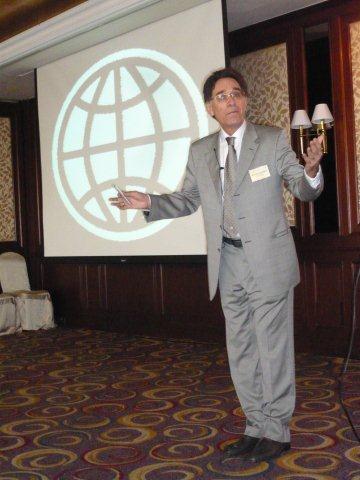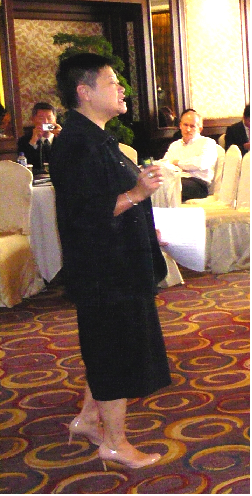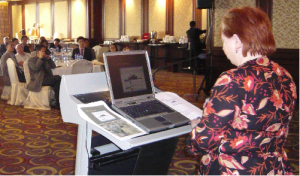Kick off with OGCIO
The conference this year was keenly aware of the economic troubles affecting the world’s economies but at the same time it was understood that it is times like this that some companies can make great strides forward in certain initiatives that might otherwise be ignored. ‘Don’t waste this crisis,’ could have been the title of the conference.
This year we were very fortunate in having Jeremy Godfrey, the Government CIO kick off the conference with a few chosen words. Jeremy reminded everyone that this is the time to ‘raise the game’. One way to achieve that would be to make certain we do not over commit but remain focused on only three or four things. It was the job of the government, he said, to be more than just a cheerleader. They will be keen on implementing many KM ideas over the next few months and years and they are already using technologies and ideas based on such things as Web 2.0.
It was clear that Jeremy was going to be extremely active in his role and that must surely be a good thing for both Hong Kong and for KM.
Nicolas Gorjestani
It was indeed an honour to welcome our first speaker, Nicolas Gorjestani, Senior Advisor and Consultant to the World Bank. He was formerly Chief Knowledge and Learning Officer at the Bank and has many years of experience in handling both crises and cultural change in large organisations.
One of the most difficult things any organisation can be confronted with, he said, is change. Having established ways of doing things over many years, it is often simply far too difficult to get people to look at how they work differently. Possibly one of the greatest reasons for companies failing is their inability to adapt to a changing world and changing markets. Nicolas said that the World Bank got rather lucky in that the CEO back in the 1990s was a man who realised this and pushed change through the organisation.
 Nicolas Gorjestani in full flow
Nicolas Gorjestani in full flow
The most important aspect of this, he said, was that it was done from ‘both ends’: lead ‘from the top’ by senior management but supported below by those who do most of the real work. If you cannot get these two groups on board, any attempt at change will fail, he said.
Nicolas used a number of images to tweak the minds of those in attendance. A glass that contains a clear liquid that goes up to half the height of the glass can be viewed in several ways. Most people see it as either ‘half-full’ or ‘half-empty’, something everybody knew. But did anybody ask what the quality of the liquid was? That, he said, may be a more important question.
Quoting Albert Einstein, he said that the thinking that gets us into difficult situations (the present economic crisis, for example) is not the thinking that will get us out of them. An image that will stay fresh in the minds of most will be that of the penguin sitting on top of a sleeping polar bear with cymbals raised, ready to stir him awake. The iceberg is melting and we must make enough noise to grab everybody’s attention, he said.
Kim Sbarcea
The second speaker was the always exciting and controversial Kim Sbarcea, Chair, Standards Australia KM Committee and Director, Thinkingshift Australia.
Kim presented two extremely different but fascinating case studies. One dealt with an organisation made up almost exclusively of lawyers and policemen, the other was a political awareness group in Morocco.
For seven years she has been working with an organisation in Australia that deals in financial issues of regulation, enforcement, audit, investigation and so forth. The 1500 employees are mainly lawyers and policemen so the first ‘lesson’ she learnt was to avoid the term ‘communities of practice’. (CoP has a rather different signification to those in her group.) So, she said, she chose words like ‘network’ and that seemed to go down quite well.
She agreed with an earlier statement of Nicolas that the ideas behind sharing information and promoting networks must be promoted at every possible opportunity, including the few moments you may have with a senior executive in a lift.
One quite difficult stumbling block, she said, was dealing with two groups of people not accustomed to sharing. Lawyers never offer to share and policemen are almost always investigating something where secrecy is the most important aspect of their work.
Kim used expressions like ‘network leader’ rather than the more standard titles in order to get away from the traditional ways of organising groups. These leaders were often chosen from outside and they made special
efforts to find people who were facilitators.
One of the more important lessons they were keen to promote was getting rid of old ideas that did not work. On top of that list was return on investment (ROI). They had previously attempted to tie KM to performance but it was a total disaster. Most employees are terribly good at ‘gaming’ what is expected of them, especially if it is a measurement of performance.
The networks are non-hierarchical and focus on ‘distributed leadership’. There are no ‘bosses’ who tell others what to do. Again, the emphasis is on facilitation. Each network also has a social host. At one point, she said, they used actors to train lawyers because actors must work well together.
In her second case study, Kim talked about being sent to Morocco to help an American non-government organisation with creating communities of practice for political activists in the Middle East. They came from all over, were mostly men and had a rather difficult time at first with an Australian woman who dies her hair odd colours. They were said to speak English but none could on the first day. She did eventually to get them all talking and things worked out rather well, once the most important aspect of knowledge management had been understood by all: trust. Only after they realised they could trust her did things begin to
happen and what she thought might be a terrible disaster turned out to be quite successful.
On that rather happy note, Kim brought up the story – famous on YouTube – of Sam, the Koala who was saved from the terrible fires in Australia recently because she learnt to trust a human trying to give her water.
Eva Lo
Despite the heavy-weights from abroad, one of the most down-to-earth and exciting talks given at the event was from Eva Lo, Director of Knowledge Management at Langham Place in Mongkok. Her energy and enthusiasm were very infectious indeed. She began with a rather blunt statement about her job: when people ask her what she does, she says she works in KM to which they reply, ‘Oh, you are in IT’. Ms Lo immediately shoots back that she does not work with machines, she works with people!
In a very brave move for a hotel in Hong Kong, Ms Lo was hired as a KM expert to help with the running of the hotel. She said that most hotels are run more as
if they were military engagements than places for people to relax and be pampered. (This is a five-star hotel.) That means, for example, that one person – rather like a general – gives out all the orders and everybody follows,
rather like ‘foot soldiers’.
 Figure 12: Eva Lo surprised many with
Figure 12: Eva Lo surprised many with
her insights and bold views
It would be far better, she said, if the employees were paid to use their brains as well as their hands. She emphasised on several occasions that whereas most people who work in the traditional area of KM work with extremely well-educated people, the hotel hires a great many minimum-wage workers.
Following the theme of the day, Ms Lo said that they tried to get the right people to share the right information. What point is there in having a senior manager
teach new recruits how to fold napkins when the person who is best at doing it is a young woman who has been folding them for years?
It was not easy trying to create a five-star hotel in this way. Not only was it very unusual for a Hong Kong hotel to put money, effort and time into a hotel managed on KM principles, it was doubly difficult because of the reputation Mongkok has within Hong Kong. Still, things seem to be working extremely well.
Hotels are accustomed to meetings and Langham Place is no exception. Ms Lo said they tried to make certain the meetings were full of shared information and that action was taken very soon afterwards. They even put tremendous effort into what may seem like mundane things. Surveys are important and not really
very revolutionary. Still, they do at least two a year and they set them up in rooms normally reserved for special guests or events. This sends a clear message to the employees that they and their ideas matter. They may not be the most radical ideas, she said, but the way they execute them is.
She was asked if she was afraid other hotels might try and steal some of her ideas. Thiselicited a great laugh: How, she asked, could anybody else execute her strategies if they did not fully understand them? It would simply not be possible to steal the ideas and even if they did, it would not hurt the hotel.
TO BE FINALISED
